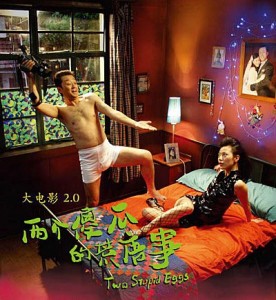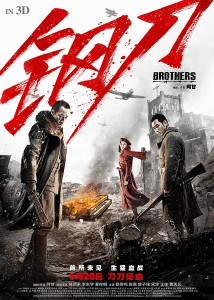Brothers
钢刀
China, 2016, colour/b&w, 2.35:1, 3-D, 94 mins.
Director: A Gan 阿甘 [Liu Xiaoguang 刘晓光].
Rating: 5/10.
Humans lose out to the VFX in this bromancey, over-the-top war tale of male friendship gone bad.
A city in northeast China, the 1930s, winter. The boyish Chen Tiejin (Li Dongxue) greets his elder “brother”, hard nut Wang Bingsheng (He Rundong), when the latter is released from prison after serving 10 years for murder. (Wang Bingsheng took the rap on behalf of the orphaned Chen Tiejin, who was then still quite young.) After having sex with a Russian whore, Wang Bingsheng celebrates in a restaurant with Chen Tiejin and then tries to leave without paying. The pair are arrested and sent to the front to serve in the Nationalist army. En route, Chen Tiejin manages to escape but is wounded and later captured by the PLA. Five years later he’s become a hardened company commander. During a bloody assault on the enemy, he goes battle-crazy and afterwards kills some captives in anger. Arrested, he’s secretly pardoned by the regimental commander and given what seems like a suicide mission – to accompany a group of female musicians across the mountains in the Hexi Corridor to Gao Town, which the PLA Fifth Army occupied a few days earlier, so they can give a New Year Concert. En route Chen Tiejin, a pianist himself, takes a fancy to the group’s pianist, Ge Lan (Xia Zidong). When a Nationalist group attempts to kidnap the women, there’s a Mexican stand-off, and the Nationalists’ commander is revealed to be Wang Bingsheng. Chen Tiejin tells him he can’t forgive him for killing one of his young soldiers, nicknamed Sixteen; he takes Wang Bingsheng prisoner and continues the journey to Gao Town. However, after another attack by Nationalist troops, Chen Tiejun lets Wang Bingsheng loose; the latter entreats him to flee with him but Chen Tiejin refuses, and wounds him in the leg to slow him down. Despite that, Wang Bingsheng manages to kidnap Ge Lan and take her to a seedy inn in the mountains.
REVIEW
The humans wage a losing battle with the visual effects in Brothers 钢刀, a bromancey tale of male friendship gone bad that pits Taiwan American actor-singer He Rundong 何润东 [Peter Ho] vs. Mainland TV actor Li Dongxue 李东学 with sometimes laughable results. Entirely shot on green screen, and processed in b&w with occasional flecks of colour, the whole film has a noir-ish, semi-manga look (similar to the 2005 US film Sin City) that’s impressive on a technical level but increasingly alienating on an emotional one. The audience is asked to care about two characters it knows hardly anything about and who, inbetween all the VFX and 3-D and other visual flash, seem to be getting very worked up about very little. As an animated film it might have worked better; but the human cast only serves to highlight the thinness of the screenplay.
It’s the first major outing by writer-director-producer A Gan 阿甘 (real name Liu Xiaoguang 刘晓光, aka Kiefer Liu) since his big-budget fantasy Don Quixote 魔侠传之唐吉可德 (2010), a Chinese re-imagining of Cervantes’ classic novel that billed itself as “Asia’s first wholly 3-D movie”. Hit-and-miss, and with one-dimensional characters, it failed to set China’s box-office alight; undeterred, A Gan continued to focus on pressing the technical envelope with Brothers, on which pre-production had begun in 2008 and the first shooting started in autumn 2010 (just prior to the release of Don Quixote). The journey from there took some five years, further lengthened by the original release date of Aug 2015 being moved forward to May 2016.
 Shanghai-born A Gan – a pen name modelled on the Chinese one for Forrest Gump – started out at the turn of the century making horror films (including The Game of Killing 天黑请闭眼, 2004, based on the online game) and comedies (like Two Stupid Eggs 大电影2.0 两个傻瓜的荒唐事, 2007) that, in the case of the latter, often had a wild, anarchic flavour and established him at the time as an offbeat comic filmmaker. However, the move to bigger, VFX-dominated productions did not go smoothly with the mix of comedy and drama in Don Quixote, despite featuring Guo Tao 郭涛, one of A Gan’s favourite comic actors, in the lead. And Brothers, apart from its opening, has no humour at all to leaven its deadly seriousness, which at times looks like an attempt to outdo the South Koreans in over-the-top machismo, especially when the pair go mano a mano in the bare-chested finale.
Shanghai-born A Gan – a pen name modelled on the Chinese one for Forrest Gump – started out at the turn of the century making horror films (including The Game of Killing 天黑请闭眼, 2004, based on the online game) and comedies (like Two Stupid Eggs 大电影2.0 两个傻瓜的荒唐事, 2007) that, in the case of the latter, often had a wild, anarchic flavour and established him at the time as an offbeat comic filmmaker. However, the move to bigger, VFX-dominated productions did not go smoothly with the mix of comedy and drama in Don Quixote, despite featuring Guo Tao 郭涛, one of A Gan’s favourite comic actors, in the lead. And Brothers, apart from its opening, has no humour at all to leaven its deadly seriousness, which at times looks like an attempt to outdo the South Koreans in over-the-top machismo, especially when the pair go mano a mano in the bare-chested finale.
After some comicbook-style main titles of battlefield carnage, the first 10 minutes sketch pretty much all we ever get to know about the two men: how the elder street “brother”, Wang Bingsheng, took the rap for his much younger, orphaned friend, Chen Tiejin, after the latter shot a rich baddie one night in an alleyway. As Chen Tiejin meets Wang Bingsheng when he’s released from prison 10 years later, there are flecks of A Gan-like comedy as the latter gets his rocks off with a Russian whore and Chen Tiejin is established as a shy virgin still in awe of his scarred and tattooed “brother”. Thereon, however, it’s grim all the way. The pair are arrested after trying to skip out of a restaurant and are sent to the front as part of the Nationalist army. When Chen Tiejin manages to escape, the two become separated – only to be thrown together five years later, when Chen Tiejin is a hardened company commander in the PLA and Wang Bingsheng ditto on the Nationalist side.
The exact period in which the story is set is deliberately vague, though it appears to begin in the 1930s in northeast China. Having the two end up on opposite sides of the civil war is also no more than a dramatic convenience, with no mention of politics: Chen Tiejin’s enmity towards his former hero is driven by a combination of battlefield madness, Wang Bingsheng’s shooting of one of his soldiers, and then by the latter’s treatment of a girl he fancies. In fact, it’s Wang Bingsheng – technically the villain of the piece – who repeatedly urges Chen Tiejin to join him, rather than perpetuate a feud.
That’s just one of several areas in which the script becomes emotionally foggy and not at all convincing. On a narrative level, the device of Chen Tiejin being ordered to escort a group of female musicians across the mountains to a besieged town is also weakly developed. Few of the women are characterised in any detail, and the corny love story between Chen Tiejin and the pianist in the group – winsomely played by newcomer Xia Zitong 夏梓桐, 25, the fox girl in the 3-D The Monkey King 西游记之大闹天空 (2014), on which A Gan was a producer – is there only to bring tensions between the frenemies to boiling point.
He, 40, who was also in The Monkey King but was better as the tour guide in Spicy Hot in Love 爱情麻辣烫之情定终身 (2016), sneers and snarls his way through the Wang Bingsheng role without being allowed a trace of irony (except in the early scene with the Russian whore); Li, 33, who was okay in Brotherhood of Blades 绣春刀 (2014) and The Wonderful Wedding 大喜临门 (2015), has a broader emotional arc, from baby-faced virgin to PTSD hard nut, but is equally one-dimensional. Other roles are just bits.
For the sheer scale of its technical ambition, Brothers just manages to squeeze an extra point: the b&w works dramatically and the flecks of red for flags, blood and flames, plus warmer pastels for the women in a few shots, are well deployed, even if the idea is hardly original nowadays. The production design, vaguely 1930s/40s, is suitably atmospheric and dystopian, and the orchestral score by South Korea’s Lee Dong-jun 이동준 | 李东俊 (who coincidentally scored Taegukgi 태극기 휘날리며, 2004, with which Brothers has several similarities) is full of the same passion shown by the actors on screen. Despite all this, the film still ends up as a cold technical exercise in which the humans are just puppets.
The Chinese title means “Steel Blades”. The film crashed and burned at the box office in May 2016, generating a tiny RMB9 million, around a quarter of Don Quixote‘s already mild gross back in 2010.
CREDITS
Presented by China Film (CN), Xi’an Qujiang Film & TV Investment Group (CN), Shenzhen Golden Shores Films (CN), Zhejiang Lynx Technology (CN). Produced by Shenzhen Golden Shores Films (CN).
Script: A Gan [Liu Xiaoguang]. Photography: Wu Jingwen, Ruan Zhenhua, Xie Ze. Editing: Li Ge, Jin Liangliang. Music: Lee Dong-jun. Production design: Ma Xin. Art direction: A Gan [Liu Xiaoguang]. Postproduction art direction: Li Qin, Fang Tao. Costume design: Wang Yan, Ma Xin. Costume direction: Yang Shaohua. Sound: Yin Jie. Action: Fu Bin, Qi Liang. Visual effects: Ding Libo. 3-D: Yao Yao.
Cast: He Rundong [Peter Ho] (Wang Bingsheng), Li Dongxue (Chen Tiejin), Xia Zitong (Ge Lan), Yang Qiming (Huang Zhijian/Jason, AP war reporter), Tian Yuan (Wang Luxiang, PLA soldier), He Ziming, Song Ning, Huang Tianyuan, Wang Wang.
Release: China, 20 May 2016.
